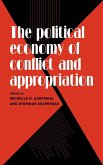Many of the fundamental questions in social science entail an examination of the role played by social institutions. Why do we have so many social institutions? Why do they take one form in one society and quite different ones in others? In what ways do these institutions develop? When and why do they change? Institutions and Social Conflict addresses these questions in two ways. First it offers a thorough critique of a wide range of theories of institutional change, from the classical accounts of Smith, Hume, Marx and Weber to the contemporary approaches of evolutionary theory, the theory of social conventions and the new institutionalism. Secondly, it develops a new theory of institutional change that emphasises the distributional consequences of social institutions. The emergence of institutions is explained as a by-product of distributional conflict in which asymmetries of power in a society generate institutional solutions to conflicts.
Table of contents:
Preface; 1. Introduction; 2. The primary importance of distributional conflict; 3. Institutions and strategic choice: information, sanctions and social expectations; 4. The spontaneous emergence of social institutions: contemporary theories of institutional change; 5. The spontaneous emergence of social institutions: a bargaining theory of emergence and change; 6. Stability and change: conflicts over formal institutions; 7. Conclusion; Notes; Bibliography.
A thorough critique of a wide range of theories of institutional change followed by the development of a new theory that emphasises the role of distributional conflict in the emergence of social institutions.
A thorough critique of theories of institutional change followed by the development of a new theory emphasising the role of distributional conflict in the emergence of social institutions.
Hinweis: Dieser Artikel kann nur an eine deutsche Lieferadresse ausgeliefert werden.
Table of contents:
Preface; 1. Introduction; 2. The primary importance of distributional conflict; 3. Institutions and strategic choice: information, sanctions and social expectations; 4. The spontaneous emergence of social institutions: contemporary theories of institutional change; 5. The spontaneous emergence of social institutions: a bargaining theory of emergence and change; 6. Stability and change: conflicts over formal institutions; 7. Conclusion; Notes; Bibliography.
A thorough critique of a wide range of theories of institutional change followed by the development of a new theory that emphasises the role of distributional conflict in the emergence of social institutions.
A thorough critique of theories of institutional change followed by the development of a new theory emphasising the role of distributional conflict in the emergence of social institutions.
Hinweis: Dieser Artikel kann nur an eine deutsche Lieferadresse ausgeliefert werden.








